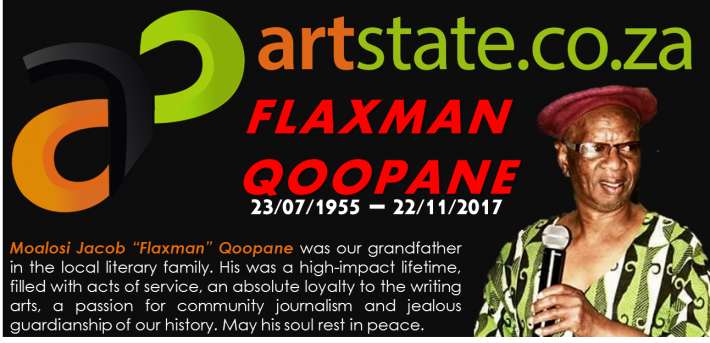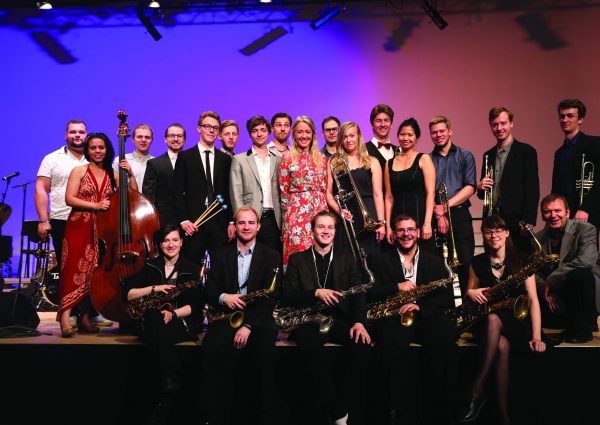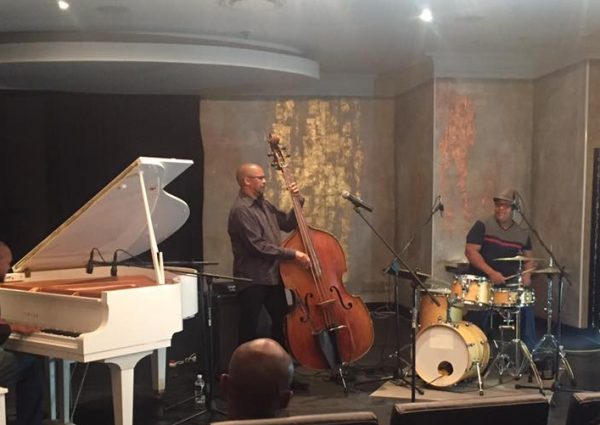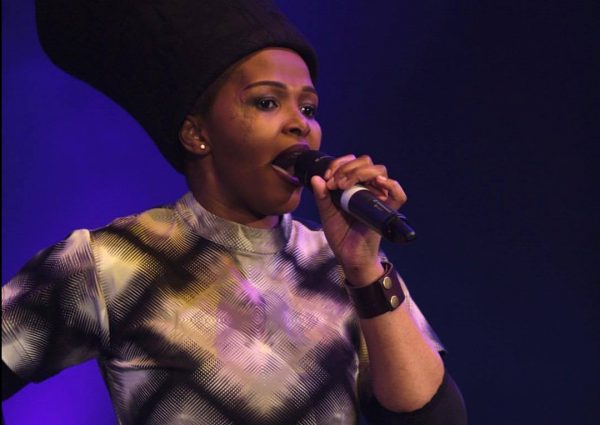Flaxman Qoopane was a snobbish little old man if ever there was one, and I loved (and envied) him for it, writes Mpho Matsitle.
Whenever I happened to chance upon Flaxman Qoopane on the streets of Mangaung, he’d brief me (as we high class literati call gossip) on the latest developments in the Mangaung (non)literary scene.
After each flash review, we’d conclude (not proud to say, but with a little schadenfreude): “That’s not literature.”
Of course, being a human being with an infinite number of possibilities, there are many Flaxmans. However the one that I was privileged to relate with was this literary snob and what in the parlance of today would be called – with all the derision the draggists can muster – a gatekeeper.
During his presentation at Breakfast with Authors, held mid-2016, he flat out called Mzwakhe Mbuli a quack. In his idiosyncratic primary school teacher style, he threw the word to the crowd to define, and my hand was up real quick. He recognised me. “A pretender, a fake, fraudster,” I said with a little esoteric smile.
I wasn’t merely regurgitating the dictionary I am so intimate with, but much more profoundly, Robert Sobukwe. The only time I had ever heard (read) anyone use the word quack with so much intensity was when Sobukwe rebuked the yellow communists. Every student of history knows how much Sobukwe hated those. Flaxman hated literature quacks just the same—so heightened was his love for, and dedication to, literature!
After all, this is a man who was banned by the white minority government, and exiled, because of a poem. The word – written or spoken – was no pastime to him. It was everything to his being. His raison d’être. His bread and butter. And claim to fame. So, to see it trampled upon and toyed with was anathema to him, a personal affront even.
However he was not a Kundera idiot who believed in something too much only to render it ridiculous. He was well aware of the sensitivity around the literature industry, by all accounts slowly dying under the heavy weight of motivational, cooking, and adult-colouring books.
It is absolutely critical that all attempts at literature – no matter how pathetic to the snobs – be encouraged. Thus, some of his most spirited critiques and exasperation were reserved for those chanced briefing sessions.
O, how I cherished those! Two peas in a pod – if we are permitted the pleasure of clichés – chewing the cud. In the streets of Mangaung during our briefing sessions the exile, age, height and stature differences where all erased by a shared reverence for literature. We were no more than two school girls skinnering. It was that beautiful and ugly. The latter for we sure did say some awful things – justly and unjustly. Sometimes almost as if caught in a vicious cycle of chasing synonyms.
“It’s absolutely disgusting,” one would begin, referring to some piece of what Lesego Rampolokeng would call “shiterature”.
“Putrid!” the other would chime in.
“Manyala!”
“Ghastly!”
And so it’d go ad infinitum. Or until he reaches for my shoulder, lock his mischievous eyes with my excited two, and implore, “Mara o ska bua.”
Mostly the latter. Actually, always the latter. And now, forever the latter. For the days of gossiping on the side of the road, on a busy sidewalk, while many people stop by to greet him, and he spares a few seconds from our blathering to share titbits of information with them, are no more.
What pains me the most is that I never got the chance to brief him on ART STATE. Yet now that (to quote our senior writer Thato Rossouw) “death’s cold and wet aftershock, its bitter and sour aftertaste” has made me “rescind into a dark existentialist and deeply contemplative place”, for the first time ever I see this development as the greatest tribute one can ever offer Flaxman: a journalist, archivist, historian, profiler and reviewer of art among many other things.
ART STATE is by all intents and purposes following on his footsteps. Letlhaku le leswa le agelwa mo go le legologolo. Had I the chance, I’d have also briefed him that ART STATE is not alone in this noble pursuit to “highlight and celebrate important figures, events, milestones and venues in the Mangaung cultural landscape. Monumentalise their existence for all posterity.”
His daughters, Mantsopa and Soso, are keeping watch on the pulse of the urban culture’s HeArt. Shaxe and Helen will make TV stars of us yet, and further down south Shadrack Maboea Jnr. and team are keeping the focus on Free State’s sports and arts.
For me personally ART STATE is my parting shot to my senior comrade in the movement. On the rare occasions that our flash moments did not end on the refrain of a secrecy pledge, we’d play a little tennis on why the other isn’t saying anything about the crimes against writing as an art.
“I haven’t the authority you do,” I’d wash my hands off the noble cause of critique.
“They’ll dismiss me as an old bitter man,” he’d throw the ball back in my court.
I remembered that he is a legend, and legends are worshiped in South Africa; never taken seriously. Keorapetse Kgosietsile bemoans the dearth of poetry whenever he’s dragged to some woke space, but we only need him to give it legitimacy by his mere presence, and for our “rubbing shoulders with the greats” selfie moments for the gram.
Lefifi Tladi’s thoughtful critique that “today’s protest poets have no ideology” was met with the most anti-intellectual knee-jerk reactions from the poetry fraternity. And who the hell listens to the daily Bavino sermons? We just react with “haha” and move right along. This is no country for old men after all.
So, really, I could not blame the old man for choosing to remain quiet. He has paid his dues. At some point aluta had to cease for him. So the ball was squarely in my court. “They are your peers after all,” he’d prod me along.
So with ART STATE we picked up umkhonto and went in gallantly in the midst of quacks to continue the good struggle, and brought in the culture of critique which was painfully missing from the city. And on this path we shall continue until the day we finally meet in the streets of black heaven and get the chance to brief him face to face.
For now, we will keep the marriage of pen and paper intact, for as our editor Ace Moloi asserts, “if there’s any debt we owe him, it is that we will never stop fighting for a reading and writing nation in our lifetime.”
I am pretty sure that he has already begun to brief Adam Small, Lebo Mathosa, Peter Nthwane, Matsemela Manaka, Winkie Direko, Arthur Nuthall Fula, Conference Moshotle and Fela Kuti – all of whom he took time to pay tribute to and brief us about – on what the world and its quacks have been up to since they departed from it.
I do hope, for his own sake, that cameras are allowed in heaven.
Till we brief again; goodbye, Flaxman.






